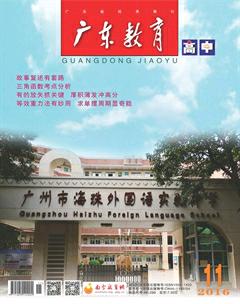高中生习作中中式英语分析
段姣弟
按照汉语的思维习惯,生搬硬套地学习和使用英语而产生的错误称为中式英语。中国人学英语常出这类错误,英语初学者或英语成绩较差的学生更为突出。笔者从词汇层面对中式英语进行分析。
词汇层面上的问题主要表现在以下六个方面。
一、字对字直译
[例1]他的年龄太小了,不能去上学。
中式: His age is too small cant go to school.
地道: He is too young to go to school.
分析:学生将“他的年龄”字对字直译为“his age”,而“his age”不可能是“go to school”动作的实施者。
[例2]我有17岁了。
中式: I have 17 years old.
地道: I am 17 years old.
分析:学生将“有”字对字直译为“have”用来表达人的年龄有多大,明显不符合英语的表达习惯。
[例3]十年后,石油将缺乏。
中式: Ten years after, the rock oil will be in short supply.
地道: Ten years later, oil will be in short supply.
分析:表示时间“……之后”,after是介词,习惯用在时间之前,而later是副词,习惯用于时间之后;“石油”直接翻译成“oil”就行了。
字对字直译造成的主要原因是只记汉语意思,不记单词的词性,不清楚单词的英语意思,不清楚单词的确切用法,没有牢记英语的一些固定搭配和习惯表达,生搬硬套。
字对字直译也是引起下面将要谈及的搭配不当、误用主语、语序不当、过多使用修饰词、不注意词性转换等问题的原因之一。
二、搭配不当
[例4]你应该一遇到生词就去查字典。
中式: You should look up the dictionary when you see a new word.
地道: You should look up a new word in the dictionary when you come across it.
分:“查字典”的实质是在字典中查生词,而不是单纯为了查看字典,所以英语的正确表达应为“look up a new word in a dictionary”。
[例5]我爸爸过去经常给我讲故事。
中式:My father used to say me stories.
地道: My father used to tell me stories.
分析:“讲故事”学生译为“say stories”,没有区分“tell”和“say”的用法,只记了汉语意思。
三、误用主语
[例6]昨天会上有个更好的计划被提出来。
中式: Yesterday meeting put forward a better plan.
地道: A better plan was put forward in yesterdays meeting.
分析:这是被动句。不清楚是谁提出的或者是谁提出的不重要,而是强调地点 “在会议上”提出。主语不是“昨天的会议”而是“a better plan”。
[例7]健康平衡的饮食:不要吃富含糖类和脂肪的食物,它们会很容易地让你长胖。
中式: A balanced diet shouldnt eat food rich in sugar and fat, because they can put on weight easily.
地道: A healthy and balanced diet: Dont eat food rich in sugar and fat, because you can put on weight easily by eating them.
分析:原句主语应该是“你”不要吃富含糖类和脂肪的食物而不是“健康平衡的饮食”;“他们”指代上文提到的“富含糖类和脂肪的食物”,“你”容易变胖,不是“他们”容易变胖。
四、语序不当
[例8]事实上,我的家人如此喜欢读书以至于我们总是买书。
中式: In fact, my family so like reading that we often buy books.
地道: In fact, my family like reading so much that we often buy books.
[例9]我的哥哥非常喜欢读书。
中式: My brother very likes reading.
地道: My brother likes reading very much.
分析:例8和例9均是由于字对字直译,忽略了中英文语序的差异,导致语序不当。
五、过多使用修饰词
[例10]当我有困难时,他会主动给我提供帮助。
中式: When I am in trouble, he will offer to help me actively.
地道: When I am in trouble, he will offer to help me.
分析:“offer to do sth.”本身就是指主动去做某事之意,所以“actively”多余。
[例11]我爸爸过去经常给我讲故事。
中式: My father often used to tell me stories in the past.
地道: My father used to tell me stories.
分析:“used to do sth.”指过去经常做某事,所以“often”和“in the past”多余。
六、不注意词性转换
[例12]当汤姆听到简的死讯时,他感到很震惊。
中式: Tom was shocked when he heard the dead of Jane.
地道: Tom was shocked when he heard the death of Jane.
解析:die是动词,death 是名词,dead 是形容词。名词作宾语,所以例12中的“dead”应该改为“death”。
[例13]李老师总是对我们很有耐心。
中式:Mr. Li is always patience with us.
地道:Mr. Li is always patient with us.
分析: patience是名词,patient 是形容词,系动词后用形容词构成系表结构,因此“patience”应改为“patient”。
责任编辑 蒋小青

